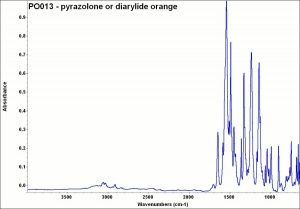Difference between revisions of "Pyrazolone"
Jump to navigation
Jump to search
(username removed) |
(username removed) |
||
| Line 27: | Line 27: | ||
== Additional Information == | == Additional Information == | ||
| − | W. Herbst, K. Hunger, ''Industrial Organic Pigments'', Wiley-VCH Verlag GmbH & Co., Weinheim, p. 266. | + | º W. Herbst, K. Hunger, ''Industrial Organic Pigments'', Wiley-VCH Verlag GmbH & Co., Weinheim, p. 266. |
== Authority == | == Authority == | ||
| − | * | + | * B. Berrie, S.Q. Lomax, 'Azo Pigments: Their History, Synthesis, Properties and Use in Artists' Materials', ''Studies in the History of Art'' , National Gallery of Art, Washington DC, No. 57, 1997 |
[[Category:Materials database]] | [[Category:Materials database]] | ||
Revision as of 06:33, 24 July 2013
Description
A bright orange azo colorant. Pyrazolone is extensively used in rubbers, but has had limited use in polyolefins and is not used in plasticized plastics because of its tendency to migrate and bleed. It is colorfast to water and detergents. Pyrazolone has been used in some air-drying paints and printing inks.
Synonyms and Related Terms
Pigment Orange 13; CI 21110; disazopyrazolone; pyrazolone orange
Other Properties
Recommended for products processed below 200 C.
Lightfast = 4-6 (Blue scale)
| CAS | 3520-72-7 |
|---|
Hazards and Safety
May migrate, bleed, nad bloom.
Additional Information
º W. Herbst, K. Hunger, Industrial Organic Pigments, Wiley-VCH Verlag GmbH & Co., Weinheim, p. 266.
Authority
- B. Berrie, S.Q. Lomax, 'Azo Pigments: Their History, Synthesis, Properties and Use in Artists' Materials', Studies in the History of Art , National Gallery of Art, Washington DC, No. 57, 1997
